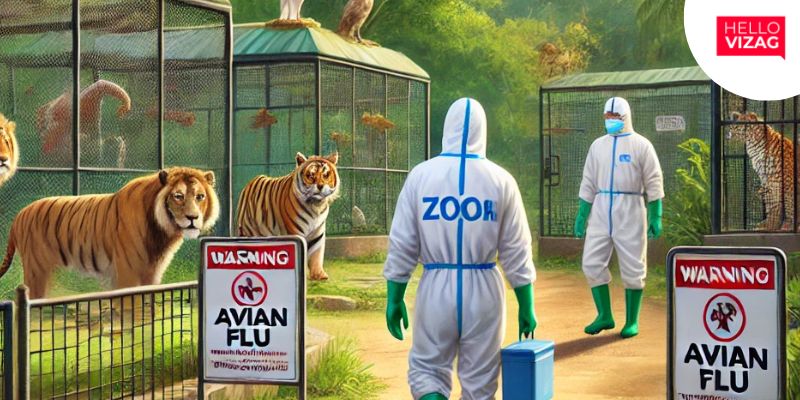Visakhapatnam Zoo Halts Feeding of Poultry Products Amid Avian Flu Concerns
In response to the recent outbreak of avian influenza in various parts of India, the Indira Gandhi Zoological Park (IGZP) in Visakhapatnam has proactively ceased the feeding of chicken and eggs to its carnivorous residents. This precautionary measure aims to mitigate the risk of transmitting the virus to susceptible animals within the zoo's care.
Understanding Avian Influenza
Avian influenza, commonly known as bird flu, is an infectious viral disease that primarily affects birds but can occasionally infect mammals, including humans. The virus spreads through direct contact with infected birds or contaminated environments. Given its potential to cause severe illness, implementing preventive strategies in areas housing diverse bird species is crucial.
Proactive Measures at IGZP
Although no cases have been reported in Andhra Pradesh, IGZP has intensified its surveillance and biosecurity protocols to safeguard its avian and mammalian inhabitants. Key actions include:
-
Dietary Adjustments: Suspending the provision of poultry products, such as chicken and eggs, to carnivorous animals to eliminate potential sources of infection.
-
Enhanced Sanitation: Regular disinfection of bird enclosures and cages to maintain a hygienic environment.
-
Monitoring Migratory Birds: Close observation of migratory and free-flying birds, including crows and pigeons, for any signs of illness.
-
Staff Vigilance: Educating zoo personnel about avian flu symptoms and enforcing strict hygiene practices to prevent potential transmission.
These measures align with directives from the Central Zoo Authority (CZA), which has advised zoos nationwide to enhance surveillance and submit daily reports until their regions are declared free of the disease.
Collaborative Efforts and Public Awareness
The IGZP is coordinating with local animal husbandry departments and wildlife authorities to ensure a unified response to the avian flu threat. Rapid response teams have been established across the district to implement continuous surveillance and preventive measures.
Visitors to the zoo are also encouraged to adhere to safety protocols, including:
-
Footwear Disinfection: Utilizing footbaths or disposable shoe covers to prevent the introduction of contaminants.
-
Hand Hygiene: Regular handwashing or use of sanitizers, especially after contact with animals or enclosures.
-
Avoiding Contact: Refraining from touching birds or entering restricted areas within the zoo premises.
Global Context and Best Practices
Zoos worldwide have implemented similar precautions during avian flu outbreaks. For instance, some institutions have temporarily closed bird exhibits or relocated birds to indoor facilities to minimize exposure to wild birds and potential infection sources.
Additionally, public education campaigns emphasize the importance of avoiding direct contact with wild birds and reporting any sightings of sick or dead birds to local authorities. These efforts aim to prevent the spread of the virus and protect both animal and human health.

 Team Hello Vizag
Team Hello Vizag



















